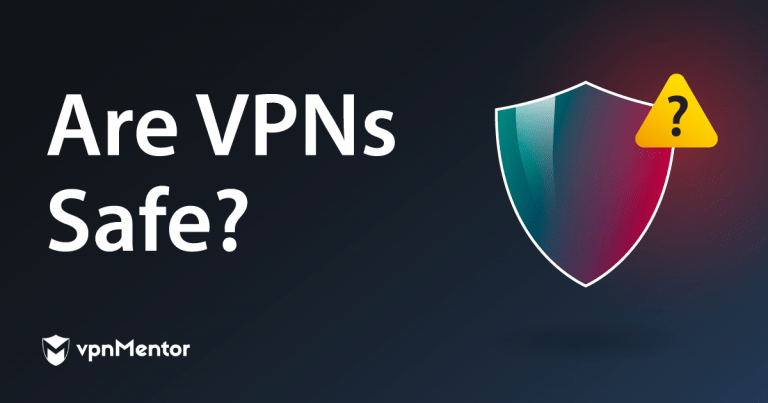Are VPNs Safe? How To Know Which Are Secure (2026)
Most VPNs advertise with promises of maximum security, impenetrable encryption, and online privacy. However, you’d be surprised that some may risk your safety and privacy to make more profit.
Certain free VPNs can even infect you with malware; others track your online activity to sell it to the highest bidder for malvertising purposes. Many have security flaws and can’t even keep your sensitive information private. Choosing the right one can be tricky, especially when you don’t know whose claims are trustworthy.
How Does a VPN Keep Me Safe Online?
In a nutshell, a VPN keeps you safe by encrypting your internet traffic and routing it through one of its secure servers. That way, nobody else can read or intercept your data, which makes it hard to steal your sensitive information.
Here are some examples of real-life scenarios where a VPN can keep you safe online:
- Security while surfing on public WiFi
Connecting to an unsecured WiFi hotspot in a café or an airport can be dangerous. Hackers can infiltrate these networks and collect your banking details, passwords, and social security number while you’re surfing. Reliable VPNs use ultra-secure AES 256-bit encryption, making your traffic virtually impenetrable.
- Keeping your shared company data secure
A VPN can help employees keep sensitive files confidential while sharing them across the network. Organizations that employ remote workers often use it to ensure secure communication between a worker’s and a business network, for example.
- Information privacy
Most users don’t read the fine print when installing apps that often collect or forward your information for advertising. VPNs ensure nobody can share your personal data, including the apps and services you use. Even your ISP can't see the websites you’re visiting. This is good because your ISP can make a personal profile of your activities that third parties use to show you ads. It can also be shared with the government, if requested. With a VPN, the data is unreadable thanks to the strong encryption, so it can’t be used against you. Reputable providers are audited by independent companies or their no-logs claims are verified in court. This is especially important in high-censorship countries like China, Russia, Qatar, and the UAE.
- Safe access to your apps and streaming services no matter where you are
A reliable VPN makes it possible to safely access the sites you need from anywhere, so you’re not tempted to visit sketchy websites that can infect you with viruses and malware.
- Secure torrenting
Torrenting with a VPN is highly recommended because it prevents exposing your real IP address. Security features like high-end encryption and a kill switch are especially important. If the VPN connection drops unexpectedly, the kill switch cuts your internet connection until the VPN is back on, so your identity is safe at all times. However, make sure to follow the regulations of your country when torrenting. Neither my team nor I condone using a VPN for anything illegal.
Are VPNs Legal to Use?
VPNs are legal in almost every country, depending on your actions. However, their usage is in a legally gray area in some countries like Iran and the UAE, where the governments heavily regulate them. Similarly, Russia and China banned non-government-approved VPNs to prevent access to the content they deem “unlawful.”
However, some activities that you use them for can be illegal. This includes torrenting copyrighted material, for example. Also, many online services block VPNs. That doesn’t make it a crime to use them, but it may go against the terms of service you agreed to when you signed up.
Essentially, in most cases, you’re not breaking the law by using a VPN itself, but you should make sure what you’re using it for is legal.
Important! Bear in mind that this article does not offer legal advice. Though we have done careful research, the legality of VPNs and other encryption software is constantly changing. We recommend you consult a lawyer or other expert if you need specific legal support, depending on the country you’re currently in.
Dangers of Free VPNs
Free VPNs often come with a hidden cost. VPNs use complex technology, which costs money to maintain. Since you’re not paying for the service, free VPNs try to earn in other ways.
Here are some of the common dangers of using a free VPN:
- False claims and compromised security. According to a CSIRO study, despite their claims, about 18% of free VPNs don’t encrypt your traffic. The others use substandard encryption protocols and have IPv6 and DNS leaks, which means your online activities and data are no longer confidential.
- Getting infected with malware. More than a third of free Android VPN apps contain some type of malicious software, meaning some of the most popular in your Google search are unsafe. If your computer is infected, hackers can steal your private data such as passwords or files. They can even make your device unusable.
- Data collecting and sharing with third parties. Many free VPNs use embedded tracking to sell your data to advertisers or even give third parties access to your data without asking you. According to the same CSIRO study, 75% of free VPNs contain third-party tracking libraries.
Your best bet is to try a reputable VPN risk-free since they’re backed by a money-back guarantee. This way, you can be sure that you're getting a safe and reliable service.
Premium VPNs vs. Free VPNs
Besides the security concerns, free VPNs usually have poor performance. Here’s why you should consider opting for an option to a trustworthy VPN:
- No data caps. Free VPNs often limit the amount of data you can use, sometimes even as low as 500MB per month. That means you wouldn’t be able to finish watching a single 40-minute episode in HD.
- No annoying ads. Free VPNs tend to earn profit through ad revenue and selling your data to advertisers. Paid VPNs usually done come with ads.
- Faster speed. Even with top-tier VPNs, some loss is expected (up to 20%) due to all the extra steps needed to secure your connection. But most free VPNs slow you down by more than average because their servers are often overcrowded.
- No bandwidth selling. Certain free providers even let their paying customers use your unused bandwidth for profit. That is potentially dangerous because someone can use this to intercept your traffic and see your sensitive information.
- Access to popular streaming services. Free VPNs rarely have enough IP addresses, so they assign the same one to many users. When a streaming platform notices a lot of traffic from a single IP, they know they are dealing with a VPN, and they block it. Premium VPNs constantly add new addresses, making it possible to safely access your favorite platforms from anywhere.
Quick Guide: How to Use a Safe VPN in 3 Easy Steps
- Download a VPN.
- Connect to a server close to you.
For the best connection and speeds, I recommend you connect to a server in your country or nearby. - Start using the internet securely!
With your traffic fully encrypted, you are safe from online threats wherever you are.
FAQs on Safe VPNs
What are the dangers of using a VPN?
Using a VPN can be dangerous only if you’re using one that's not safe. They are actually recommended for improving online safety. Still, some (especially free VPNs) can compromise your security, infect you with malware, and track your activities. Besides security and privacy concerns, some VPNs are also often slow and limit your data usage.
A study by CSIRO on free Android VPN apps found that about 18% don’t encrypt the traffic despite promises, and almost 40% contain malware. Many use embedded tracking to collect data on you for advertising purposes. They can even share this data with third parties putting you at risk of identity theft. The study showed only 25% of VPNs on the Google Play Store don’t use trackers. Users are unaware of security or privacy risks when signing up for them because they’re advertised as safe.
Which VPNs are safe?
Only VPNs with powerful encryption protocols, IP and DNS leak protection, and a strict no-logs policy are safe. Since this type of technology isn’t cheap, it’s mostly paid VPNs that can be called truly secure. Here are some features that they have:
- Strong encryption levels and protocols like WireGuard, OpenVPN, IKEv2, or Lightway. All provide 256-bit AES encryption, ensuring that your data can't be deciphered if intercepted. Most of these protocols are open-source. That way, anyone can check their code and see if anything nefarious is happening there.
- Built-in DNS, WebRTC, and IP leak protection. Data leaks can occur, but a good VPN can prevent this with special features.
- A strict no-logs policy. You want a VPN that doesn’t collect your data or share it with third parties. It’s best if a VPN has undergone an independent audit to confirm its privacy claims.
- A kill switch option. If your VPN connection drops suddenly, the kill switch turns off your internet altogether, so you are never at risk of various online threats.
Do VPNs steal your data?
Yes, some untrustworthy VPNs can steal your data. It’s mostly free VPNs that track your online activity and sell your data to third parties for advertising purposes. A study by CSIRO has found that only 25% of Android VPN apps don’t contain embedded tracking libraries.
Can free VPNs be trusted?
Unfortunately, very rarely. While there may be some that don’t endanger your privacy, most free VPNs don’t have the resources to keep you safe online. Free VPNs are unreliable because they often use embedded trackers in their apps, infect you with malware, and have dubious ownership. Instead, I recommend using a tried-and-trusted VPN that never logs any of your data and comes with a money-back guarantee.
Which VPN is safe for banking?
VPNs with strong security, such as 256-bit AES encryption and a kill switch, are safe for banking. High-level security features prevent hackers from stealing your sensitive data. The US government even uses this encryption, so it’s almost impossible for cybercriminals to crack the key. All the VPNs on my list can protect you while banking online.
Can VPNs keep me safe on public WiFi?
Yes, trustworthy VPNs with strong encryption can easily protect you while using unsecured WiFi.
The Bottom Line
VPNs are not only secure but are recommended for improving your online safety. Still, not all of them can deliver on that promise. Some (especially free ones) can compromise your security by infecting you with malware, tracking you, or selling your data.
With a reliable VPN, all your data and activities are kept safe. Your digital footprint is under layers of strong encryption and rerouting. Trustworthy VPNs also don’t keep track of any of your data. That makes it much harder for anyone trying to monitor or steal your personal or business information.




Please, comment on how to improve this article. Your feedback matters!